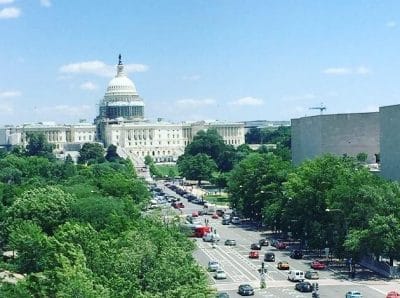Earlier this week, Governor Phil Bryant was in D.C. to answer questions at a committee meeting chaired by Senator Roger Wicker.
Senator Roger Wicker, chairman of the Senate Committee on Commerce, Science, and Transportation, chaired a hearing to discuss the “Blue Economy,” which is the sustainable use of our nation’s ocean resources for economic development and growth.
Wicker invited Governor Bryant to share Mississippi’s recent successes in the ‘Blue Economy’ with the committee.
“The impact of the oceans on our economy is everywhere,” Wicker said in his opening statement. “In Mississippi, we move 25 million tons of goods through the Port of Gulfport every year, and those goods end up throughout our nation and the world. A hurricane that hits the Gulf Coast can have a crippling effect on energy prices, delayed freight, and economic damage throughout the country.”
In the last Congress, Wicker led efforts to improve the use of our nation’s ocean resources, including the Modern Fish Act and the Commercial Engagement Through Ocean Technology Act (CENOTE), both of which were signed into law. The laws improve data collection in our oceans and make federal policies towards fishing more responsive to the needs of recreational fishermen.
In his opening statement, Governor Bryant spoke of the key role Mississippi has played in developing the “Blue Economy.”
“On the Mississippi Gulf Coast, we have embraced the Blue Economy with all our energy and ingenuity,” Bryant said. “Above all other concerns, we care about our land, our air and our water. They are part of our heritage and community.”
Bryant pointed to the contributions of Mississippi institutions to the success of the Blue Economy, including the Mississippi Department of Marine Resources; shipbuilders like Huntington Ingalls, V.T. Halter, and U.S. Marine, Inc., along the Mississippi Gulf Coast; the University of Southern Mississippi Marine Research Center at the Port of Gulfport; and Stennis Space Center in Hancock County.
In his questions to Bryant, Wicker asked how universities and other stakeholders can work together to boost the ocean economy. Bryant said that all of the state’s research universities will work with the private sector, NOAA, and the U.S. Navy to develop new approaches to oceans management.
“It’s critical to have that research component, after the (BP oil) spill, after we had one of the largest manmade disasters following one of the largest hurricanes known in our time,” Bryant said. “We had to take a really serious look at what that ocean will look like, not only now, but a hundred years from now.”
Bryant also pointed to the importance of subsurface vessels to improve oceans management and our national security. Mississippi institutions have been advancing this technology for years.
“The United States Navy is moving rapidly into subsurface vessels,” Bryant said. “As I like to say, every general wants to know what is over the next hill and every captain wants to know what is out in front of his ship.”
Wicker also asked Bryant about the need to improve our nation’s ports to meet the demands of 21st century.
“As the economy of this great country is growing, we are exporting,” Bryant said. “Mississippi… has exponentially increased the amounts of exports that we’re seeing moved through our ports.”
Bryant continued, “We’ve got to deepen that port, have multimodal opportunities to move products in and out of that in a safe way, and maintain air quality in and around there, and provide jobs, particularly to low and moderate income personnel,” Bryant said.




